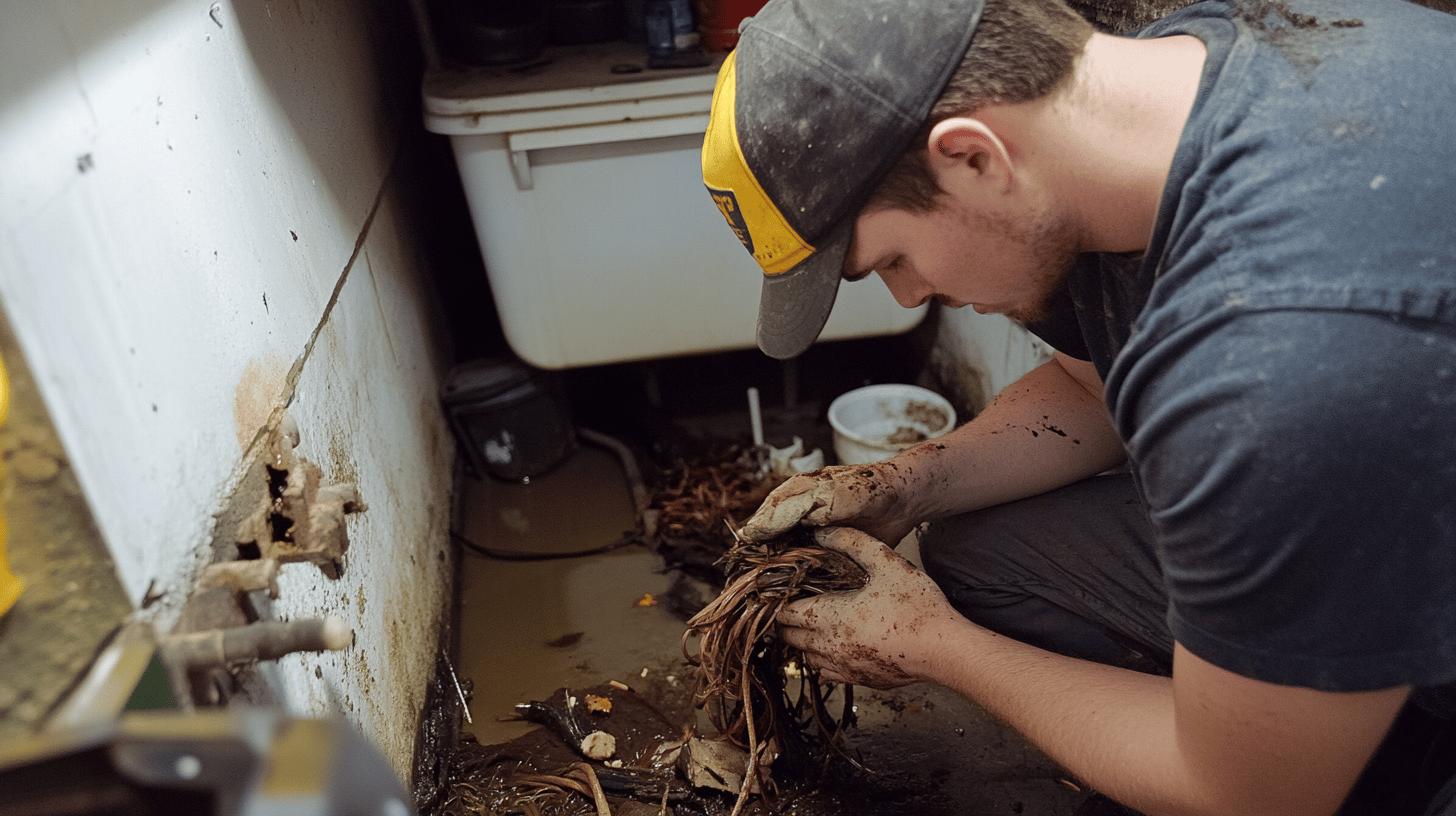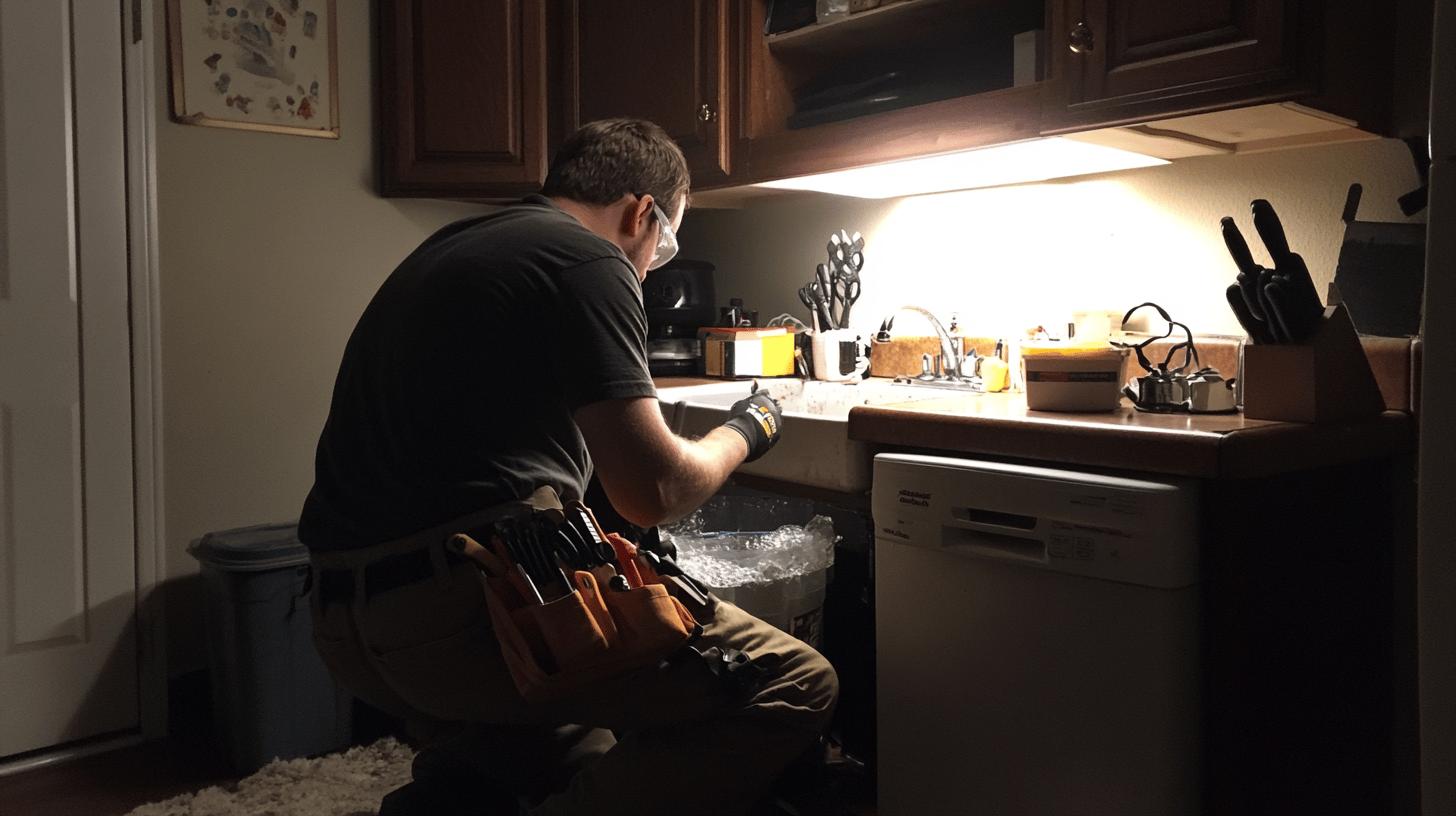TL;DR:
- Early Signs of Blockage: Foul smells, overflowing water, gurgling sounds, slow drainage.
- Common Causes: Tree roots, toiletries, foreign objects, cooking oil, food scraps, mineral buildup, hair, natural debris.
- DIY Solutions: Boiling water, hot water with bicarbonate and vinegar, caustic cleaners, plungers.
- When to Call a Professional: Recurring clogs, persistent slow drainage, multiple drains affected.
- Professional Tools: CCTV for inspection, hydro jets for clogs, pipe relining for damage.
- Recommended Tools: Chemical drain solutions, pipe cleaners, drain snakes.
- Safety Tips: Follow instructions, wear gloves and eye protection, ensure ventilation, use tools carefully.
Blocked drains can mess up your daily routine. Dealing with stinky bathroom drains or a sewage smell in your house is no fun. Spotting the early signs of a blockage is super important to fix the problem before it gets worse. In this article, you’ll find quick and easy solutions to get rid of drainage blockages, with tips from plumbing experts. Learn about those nasty smells, overflowing water, and slow drains, and get the info you need to keep your home’s plumbing in great shape.
Recognizing Signs of a Drainage Blockage
Catching the early signs of a drainage blockage is super important to prevent big problems and costly repairs. Ignoring these signs can make things a lot worse. If something feels off in your drainage system, it’s crucial to take action quickly.
Common warning signs include:
- Foul smells
- Overflowing water
- Gurgling sounds
- Slow drainage
Ignoring signs of a blocked drain can lead to serious structural problems and health risks. Blockages can cause water to back up into your home, leading to water damage and mold growth. Stagnant water from clogs can also attract bacteria and pests, which can be harmful to your health. Catching these signs early and taking action can help prevent complications and keep your drainage system working properly.
Common Causes of Drainage Blockages

Drainage blockages can happen for many reasons, and knowing what causes them can help you prevent clogs. They can occur deep in the plumbing system or in more accessible areas, like your basement. By figuring out the root cause of a blockage, you can take steps to keep your drains clear and working properly.
| Cause | Description |
|—————–|—————————————————————————–|
| Tree roots | Roots can infiltrate pipes, causing severe blockages and structural damage. |
| Toiletries | Items like wet wipes and sanitary products can create dense clogs. |
| Foreign objects | Toys and other non-flushable items can get lodged in pipes. |
| Cooking oil | Grease and oil solidify, leading to stubborn blockages. |
| Food scraps | Organic matter like vegetable peels can accumulate and obstruct flow. |
| Mineral buildup | Hard water deposits can narrow pipes and restrict water flow. |
| Hair | Hair strands can tangle and form significant blockages, especially in bathrooms. |
| Natural debris | Leaves and dirt can enter outdoor drains, leading to clogs. |
Being careful about what you put down the drain and keeping up with regular plumbing maintenance can help you avoid many blockages. Simple steps, like using drain covers and throwing away grease instead of pouring it down the sink, can go a long way in keeping your drainage system clear and clog-free.
DIY Methods for Drainage Blockage Removal
DIY solutions for blocked drains can be super helpful, especially for minor clogs. These methods are simple and often use items you already have at home, making them easy for most people to try. Knowing how to use these techniques can save you both time and money while keeping your drainage system running smoothly.
To try at home:
- Boiling water
- Hot water and bicarbonate soda mixture
- Vinegar
- Caustic cleaners
- Plungers
Boiling water is a simple and effective way to clear minor clogs, like grease or soap buildup. Just pour it down the drain to dissolve and loosen the blockage. For a stronger fix, you can mix hot water with baking soda and vinegar. First, pour hot water down the drain, then add half a cup of baking soda followed by a cup of vinegar. Let it sit for about 10-15 minutes, and then flush it with more hot water. This natural cleaner works well for organic clogs and is safe for the environment.
If you’re dealing with tougher clogs, caustic cleaners can help, but be careful with those strong chemicals. Plungers are also useful; they create a vacuum seal over the drain to dislodge stuck debris and get the water flowing again.
But if you’re having serious issues, like constant clogs or slow drainage, it’s probably best to call a plumber. They have the right tools and know-how to tackle complex drainage problems effectively.
When to Call a Professional for Drainage Blockage

DIY methods are great for minor clogs, but they have their limits. Techniques like boiling water, vinegar, and plungers work well for simple blockages, but they might not cut it for more severe issues. If you’re facing recurring clogs, slow drainage, or bad odors, it’s a sign that something bigger is going on, and you might need a professional to step in. If multiple drains are acting up at the same time, it’s definitely a deeper problem.
Professional plumbers have advanced tools and techniques to deal with tough blockages. For instance, they use CCTV cameras to inspect inside the pipes and pinpoint the exact location of the blockage. Hydro jets blast high-pressure water through the pipes to clear stubborn clogs. If there’s extensive damage, they can use pipe relining to repair and reinforce pipes without digging up your yard, providing a long-lasting fix for recurring issues.
When choosing a plumber, go for someone reputable. Look for licensed and insured professionals with positive reviews and a solid track record. They should offer clear pricing and service warranties. Hiring a qualified plumber not only tackles your current problems but also helps prevent future ones, saving you both time and money.
Recommended Tools and Chemicals for Drainage Blockage Removal
Using the right tools and chemicals is super important for clearing drainage blockages effectively. Chemical drain cleaners can help dissolve grease, hair, and other organic stuff in the pipes, but you need to be careful with them since they can be really strong.
For deeper clogs that chemicals might not clear, tools like pipe cleaners and drain snakes work great. These tools can reach and remove blockages that are stuck further down the line. You can easily find a variety of these tools at home improvement stores.
- Chemical drain solutions
- Pipe cleaners
- Drain snakes
- Tools from home improvement stores
Safety is key when using these tools and chemicals. Always follow the instructions on the labels to avoid damaging your pipes or hurting yourself. Wear gloves and eye protection when handling strong chemicals to prevent irritation. Make sure there’s good ventilation if you’re using harsh cleaners in small spaces. And when using mechanical tools like drain snakes, be cautious to avoid scratching or damaging the pipes. Using everything properly not only keeps you safe but also makes removing blockages more effective.
Final Words
Spotting the signs of a drainage blockage early is super important to avoid bigger problems down the line. Watch out for foul smells, overflowing water, gurgling noises, and slow drainage—they’re all red flags. Knowing common causes like toiletries, cooking oil, and natural debris can help you prevent clogs.
For minor blockages, DIY methods like boiling water and vinegar can work well. But if you’re dealing with persistent or serious issues, you might need a pro with advanced tools to help out.
Always use the right tools and chemicals safely to effectively clear those blockages. Keeping up with maintenance and acting quickly will keep your plumbing system running smoothly. Stay proactive and informed for an easier time dealing with drainage issues!
FAQ
How can I clear a clogged drain deep in the pipe?
To clear a clogged drain deep in the pipe, try using a drain snake. This flexible tool can reach into pipes to dislodge blockages, such as hair or debris, that are causing the clog.
How do you unblock outside drains?
To unblock outside drains, remove debris from the surface, then use a garden hose with strong pressure or a drain snake to clear any obstructions. Preventative measures, like regular cleaning, are crucial for maintenance.
How can I clear a clogged drain with standing water?
To clear a clogged drain with standing water, boil water and pour it carefully down the drain. This can dissolve blockages. Use a plunger to create suction and displace remaining clogs if necessary.
How do you clear a blockage in a PVC pipe?
To clear a blockage in a PVC pipe, consider using a homemade solution of hot water, bicarbonate of soda, and vinegar to break down clogs. Alternatively, a chemical cleaner designed for PVC is effective.
What steps can I take for bathroom drainage blockage removal?
For bathroom drainage blockage removal, use a plunger to dislodge clogs. If ineffective, try a mixture of hot water and baking soda followed by vinegar. Repeat if needed for persistent blockages.
How can I unblock a drain using home remedies?
Unblock a drain using home remedies, such as pouring hot water down the drain, or using a mixture of baking soda and vinegar. Let it fizz and flush with more hot water.
What is a drain snake and how does it work?
A drain snake is a flexible tool designed to remove clogs by reaching into pipes and physically breaking up or retrieving debris. It’s effective for deeper or persistent blockages.
How can I unblock a badly blocked drain?
To unblock a badly blocked drain, use a combination of chemical drain cleaners and a mechanical tool like a drain snake. If these fail, contact a professional plumber for assistance.
Can I unblock my own drain, or do I need a professional?
You can unblock your own drain using a plunger, drain snake, or home remedies. If these methods don’t work or if clogs recur frequently, consult a professional plumber.
What is a permanent solution for drainage blockage?
A permanent solution for drainage blockage involves preventing future blockages through regular maintenance, such as periodic cleaning, proper disposal of waste, and using strainers to catch debris.

